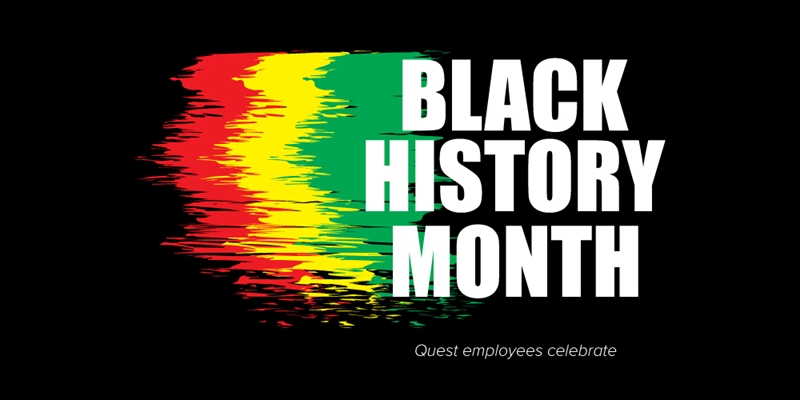Today marks the start of Black History Month – an annual celebration of the achievements of African Americans and a time for recognizing their central role in U.S. history. For those who may not know, these celebrations started as early as 1915 as “Negro History Week” by renowned historian Carter G. Woodson. Then, due to the growing awareness of the Black identity and the Civil Rights Movement, Black History Month was officially recognized in 1976 by President Gerald Ford and by every President after that.
As the chair of the Quest Colors Employee Resource Group, I am delighted to join my fellow colleagues in honoring Black History Month by offering reflections on the 2024 theme: African Americans and the Arts. This theme highlights the many impacts African Americans have had on visual arts, music, cultural movements and more.
I’m excited to share more on what has been most influential for me and my fellow Questies.
African American art, music and cultural inspirations
Throughout this nation’s history, music has always been a vehicle of expression in the African American community. We heard the voices of our Black ancestors sing coded messages in the form of negro spirituals. We felt the pain in the voices of our great blues singers from the deep south. We experienced the hope and ambition of our jazz greats like Miles Davis and John Coltrain. And we can’t forget the innovative pioneers of rock music like Chuck Barry and Little Richard. With all that said there has never been a musical art form more powerful and influential than that of Hip Hop music.
Hip Hop music, born from the streets of the Bronx in the 1970s, has transcended its humble origins to become a global cultural phenomenon. Its impact on popular culture is immeasurable, shaping the way we dress, speak and even think. This genre, which emerged as a form of expression in African American and Latino communities, has become a powerful force that influences not only music but also fashion, language and, most importantly, social activism.
From the gritty tales of life in the inner city to the celebration of success against all odds, Hip Hop became a medium through which artists conveyed their experiences and perspectives. The genre's emphasis on authenticity and real-life storytelling resonates with audiences around the world. It offered an alternative narrative to mainstream media, allowing artists to share their struggles, triumphs and perspectives on social issues. This authenticity contributed to the genre's staying power and its ability to connect with diverse audiences.
Artists have used their platforms to address issues such as systemic racism, police brutality and economic inequality. From the politically charged lyrics of Public Enemy and the anger of NWA to the socially conscious messages of Kendrick Lamar, Hip Hop has been a catalyst for important conversations. The genre's ability to articulate the experiences of marginalized communities has made it a potent force in advocating for social change.
The globalization of Hip Hop has led to collaborations between artists from different countries and the fusion of diverse musical styles from South Korea to the continent of Africa. This cross-cultural exchange has enriched the genre and expanded its reach to new audiences. As we continue to witness the evolution of this genre, one thing remains clear: the cultural impact of Hip Hop is here to stay.
I had the pleasure of learning more about how African American art has inspired some of my colleagues. Read on to learn more about what art, music, and cultural movements from African American history inspires them the most.
“What art, music or cultural movement inspires you the most and why?”

Ara Carter, Sales Engineering Director
“As I think about Black History Month and our inspiring artistic history, my thoughts go to our influence musically. I have always been fascinated by the Black contribution to Jazz. It is a music genre that was primarily originated by the African American community in New Orleans the around the 1920s. History tells us that it is a combination of Ragtime, African American folk music and the blues.
I find Jazz to be a unique artistic form due to improvisation. Many artists would make up songs and rhythms on the spot during live performances. This musical improvisation allows the artists to find and play their own sound. For example, famous trumpeters such as Louis Armstrong, Dizzy Gillespie and Miles Davis each have their own unique sound and style of playing the same instrument.
What amazes me most is that many of the Jazz greats received very little formal education. Many didn’t even finish high school. From an early age, most were either self-taught or learned to play from musical mentors. As they learned and developed, they were able to express their emotions through music during their performances.
As a person of color, I am very proud of the African American influence and contribution to the music genre of Jazz. While Jazz greats such as Duke Ellington and Charlie Parker established Jazz, some of my favorite current artists, such as Wynton Marsalis, Robert Glasper and Steve Turre, are pushing it forward and keep me listening. It is a music genre that has gone worldwide and even became a major influence on other Black music genres such as Rhythm & Blues, Funk and even Hip Hop.”

Aaron Newsome, Product Manager
“As we celebrate Black History Month, I'm reminded of the trailblazers who paved the way for others. Those who shattered the stereotypes and succeeded above all odds. One such figure who profoundly impacted my perspective is Misty Copeland. Her rise to the top of classical ballet, an artform not known for inclusivity or diversity, is a testament to the power of persistence and determination.
Anyone who's ever seen Misty dance can attest to the undeniable talent and grace she displays in her art. She will forever be known as the first African American female principal dancer with the American Ballet Theatre. What may be even more inspiring is her work off the stage, which includes advocating for diversity and inclusion in the arts.
I once listened to an interview with Misty Copeland, where she discussed some of the challenges she encountered in her career. There was mention of a quote by George Balanchine, co-founder of the New York City Ballet. The quote was, ‘A ballerina should have the complexion of a freshly peeled apple.’ Something about that quote and her response has really stuck with me.
While she didn't respond to the quote directly, it is a great example of the historical biases she's had to overcome. She emphasized the importance of breaking down stereotypes and expanding the definition of beauty in ballet to include dancers of all backgrounds and skin tones.
Rather than admit defeat and give in to the ‘they don't want us here’ mentality, Misty always kept pushing forward. Her journey exemplifies the possibilities that arise when talent, tenacity and a commitment to inclusivity converge.”

Joseph Parks, Account Manager
“Prior to transitioning into sales roles in 2018, I spent 13 years living in New York City and working as a Theatrical Producer. During that time, one of the most important issues in artistic programming and casting was diversity in an industry that could at times be dominated by white male leadership.
At the end of my time with the company, we commissioned Marcus Gardley (The Color Purple 2023) to write a new play about the life of Malcolm X called X: Or, Betty Shabazz v. The Nation. This was a wonderful opportunity for the company to employ an almost entirely Black cast and share an amazing story about an important chapter in Black History. We also ran it during Black History month and offered free tickets to many schools for educational purposes.
For me, being a part of that production was the ultimate form of allyship: to be able to employ those amazing actors and work for a company that worked with Marcus to write a beautiful script to uplift their community. As an ally for any community, the best thing you can do is give people an opportunity to tell their story and give them a platform for their voices to heard.”
Ways to celebrate and honor Black history
There are many ways to celebrate and honor Black History Month – but we can all take it a step further by honoring Black history year-round. Here are just a few of the ways you can celebrate, participate and become more informed and involved with the African American community.
- Take a stand and challenge whenever you see discrimination, bias or prejudice in any form.
- Educate yourself on Black History Month and African American history through books, documentaries, podcasts, etc.
- Visit African American and Black History museums.
- Get involved or donate to organizations that support and empower the Black community.
- Read books by Black authors and feature African American history and culture with your children. Here is a curated list from Harper Collins.
- Support Black-owned businesses.
- Start or join an employee resource group at your company.



